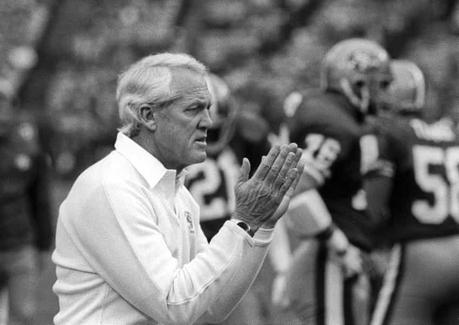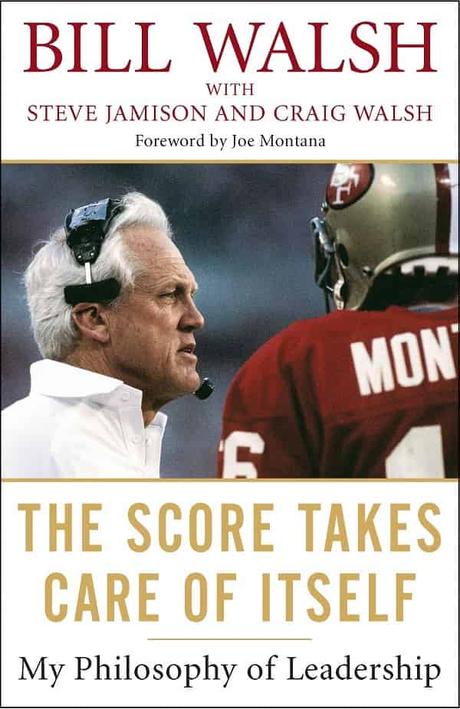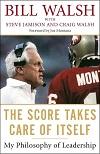
In 1979, Bill Walsh took over a San Francisco 49ers team that was at the bottom of the NFL. Within three years, they were Super Bowl champions and a dynasty was born. The 49ers would win three Super Bowls under Walsh.
Although Walsh’s achievements on the field places him in rarefied air, his leadership and organizational skills are perhaps best demonstrated by the fleet of future head coaches he mentored. A stunning number of today’s coaches came up under the Bill Walsh coaching tree.
Pete Carroll (author of Win Forever--fully reviewed here), Mike Holmgren, George Siefert were all Walsh protégés who would go on to win Super Bowls of their own, demonstrating the key characteristic of exceptional leaders: they create other exceptional leaders.
In Bill Walsh’s book, The Score Takes Care of Itself (also my top pick for the must-read books for coaches), the legendary coach breaks down his coaching philosophy. Interweaving stories and anecdotes of his coaching career along with practical tips for implementation, Walsh provides aspiring leaders a clear blueprint for creating a winning team.
Having read the book a few times now, and returning to it again recently, I gathered around twenty pages of notes, highlighted passages, key quotes, and my own thoughts on Walsh’s leadership bible.
Below are some of my favorite lessons that leaders can pull from Bill Walsh’s The Score Takes Care of Itself.

Paperback | Audiobook | Kindle
Break down high-performance and tackle each aspect relentlessly and at different angles.
Performing at a high level isn’t that big of a mystery. Break down what you are trying to achieve, piece by piece, and attack it in practice. Separate the ideal result/outcome into a series of skills and characteristics which can be improved upon.
With enough stimulus and repetition, excellence becomes habitual. It becomes the default.
- “After careful analysis, [the coaches] identified thirty specific and separate physical skills—actions—that every offensive lineman needed to master in order to do his job at the highest level, everything from tackling to evasion, footwork to arm movement. Our coaches than created multiple drills for each one of those individual skills, which were then practiced relentlessly until their execution at the highest level was automatic—routine ‘perfection.’”
When the results don’t go your way, look at improving your process.
The Standard was the goal, not winning. Having a solid process and foundation would drive excellence and wins. Not focusing on winning at all costs. Walsh was aware that this would be seen as backwards to some.
- “This was radical in the sense that winning is the usual prime directive in professional football and most businesses.”
Walsh had “a comprehensive standard and plan for installing a level of proficiency—competency—at which our production level would become higher in all areas, both on and off the field, than that of our opponents.”
- “Beyond that, I had faith that the score would take care of itself.”
- “I directed our focus less to the prize of victory than to the process of improving.”
- “Winning would take care of itself, and when it didn’t I would seek ways to raise our Standard of Performance.”
Winning and losing belong to the whole team.
Walsh fostered a sense of interdependence on the team, an understanding that when Jerry Rice scored a touchdown, or Joe Montana threw a bomb, that they were not solely responsible, but the extension of others.
Star players were repeatedly demonstrated this fact as well. Star, benchwarmer, offense, defense—they were all connected.
- “We are united and fight as one; we win or lose as one.”
Champions are champions before they win.
Winners are winners before they win. Even though they weren’t winning games yet, the 49ers perception of themselves was beginning to shift during the first couple years of Walsh’s tenure.
- “The 49ers self-perception was improving; individuals began acting and thinking in a way that reflected pride and professionalism, even as we continued to lose games.”
- “The culture precedes results. It doesn’t get tacked on as an afterthought on your way to the victory stand. Champions behave like champions before they’re champions; they have a winning standard of performance before they are winners.”
Your standard (or process) helps you keep your cool under stress and pressure.
Walsh’s 49ers were able to thrive under pressure-packed situations because all they had to was adhere to their Standard of Performance when they stepped out on the field.
Whether it was a big game, a preseason game, or practice, the Standard was the same. This removed a lot of the extra hype that comes with important games, and the stress and tension that come with it.
- “By focusing strictly on my Standard of Performance, the 49ers were able to play the bigger games very well because it was basically business as usual—no “try harder” mentality was used.”
Walsh strove to keep things simple when the pressure was on. Instead of focusing performance or trying to emphasize the importance of a game (like they didn’t know already), he would often do “less strategizing for a Super Bowl game, because in the midst of the extreme pressure I placed a premium on fundamentals.”
High pressure situations are exactly when your Standard should be most relied upon. It cuts down the exterior noise, whether it’s the media, the expectations, or the competition.
- “You must reach back and rely on your ability to do things at a high level. There isn’t much time to meditate or think things through. The pressure of the situation can just wipe that all out, and you’re left with the raw bones.”
Competition provided a natural increase in the Standard. But the result, the outcome, was merely a natural extension of all the work, standards, and preparation that preceded it.

Proper planning generates confidence.
Walsh would script plays for the game to give players and coaches a sense of calm and control. Because they knew what plays they would start the game with, players went in to both practice and games with something to focus on besides “win!” or “play well!”
In practice, Walsh would tell the players to run a play, and that it would be the first play of the game.
- “Right away the expectation level would pop up. Now they connected practice with the game. The scripted plays extended that.”
- “The players and coaches could sleep a little better because I had alleviated some of the deep anxiety caused by uncertainty prior to the competition; they were somewhat relieved because they could anticipate what we’d do in the opening stages of the battle.”
Control what you can control.
Despite Walsh’s thorough planning and Standard, he was aware that this did not guarantee victory. There were things out of his control that could happen to influence the outcome of a game: a weird bounce of the ball, a blown call by the referee, an injury.
Happenstance happens.
But for everything else, the other 80%, that’s where his focus and preparation would go.
- “I accepted the fact that I couldn’t control that 20 percent of each game. However, the rest of it—80 percent—could be under my control with comprehensive planning and preparation.”
Learn from victories and defeats.
Winning and losing can both blind us to the reality of how we performed. The emotion of winning or losing can skew our perspective. Keep a healthy perspective both in victory and in defeat.
Rarely is there a case where everything is perfect under the hood in victory, and even in defeat there are things that are working well. Don’t throw out the good when bad things happen.
You may have been closer to a better result than you think.
- “When that goal is attained, a common mistake is to assume things are fine. Conversely, when you or the organization fall short of the goal, the letdown can be so severe you’re blinded to substantive information indicating that success may be closer than you would imagine.”
Use enthusiasm to push the message.
Leadership means being able to sell the play. Sell the message. Sell the program.
When Walsh would outline plays for week’s game, he would set-them up with “an enthusiastic tone of voice and positive words.”
In a presentation before a game against the Dallas Cowboys, Walsh used some of the following descriptions to pump up the players and keep them focused:
- “Guys, this one should knock them on their asses!”
- “Now, here’s one that I think is almost perfect for us.”
- “I think we’re gonna have some fun with this one. It’s a beauty!”
- “This one will work just great. You’ll see why right now.”
“I believe in you” is the most important thing you can tell someone.
Instill belief in your players and team members by reminding them that you believe in them. Even if they are your star quarterback and outwardly project the confidence of a champion, remind them consistently that you have faith in them.
- “The most powerful way to do this is to have the courage to say, ‘I believe in you,’ in whatever words—or their equivalents—constitute the most inspirational message a leader can convey. There are many ways to do it, but the underlying message should be the same, ‘I believe in you. I know you can do the job.’”
- “Few things embolden and create self-confidence in a person like hearing those words from an individual whose judgment he or she respects, especially if that person is you, his or her boss.”

Paperback | Audiobook | Kindle
More Resources:
Lead Like a Champion: 5 Must-Read Books for Coaches. These are my favorite five books for coaches and leaders from some of the top coaching minds on the planet.
Check out this list of my favorite mental toughness books for athletes.
